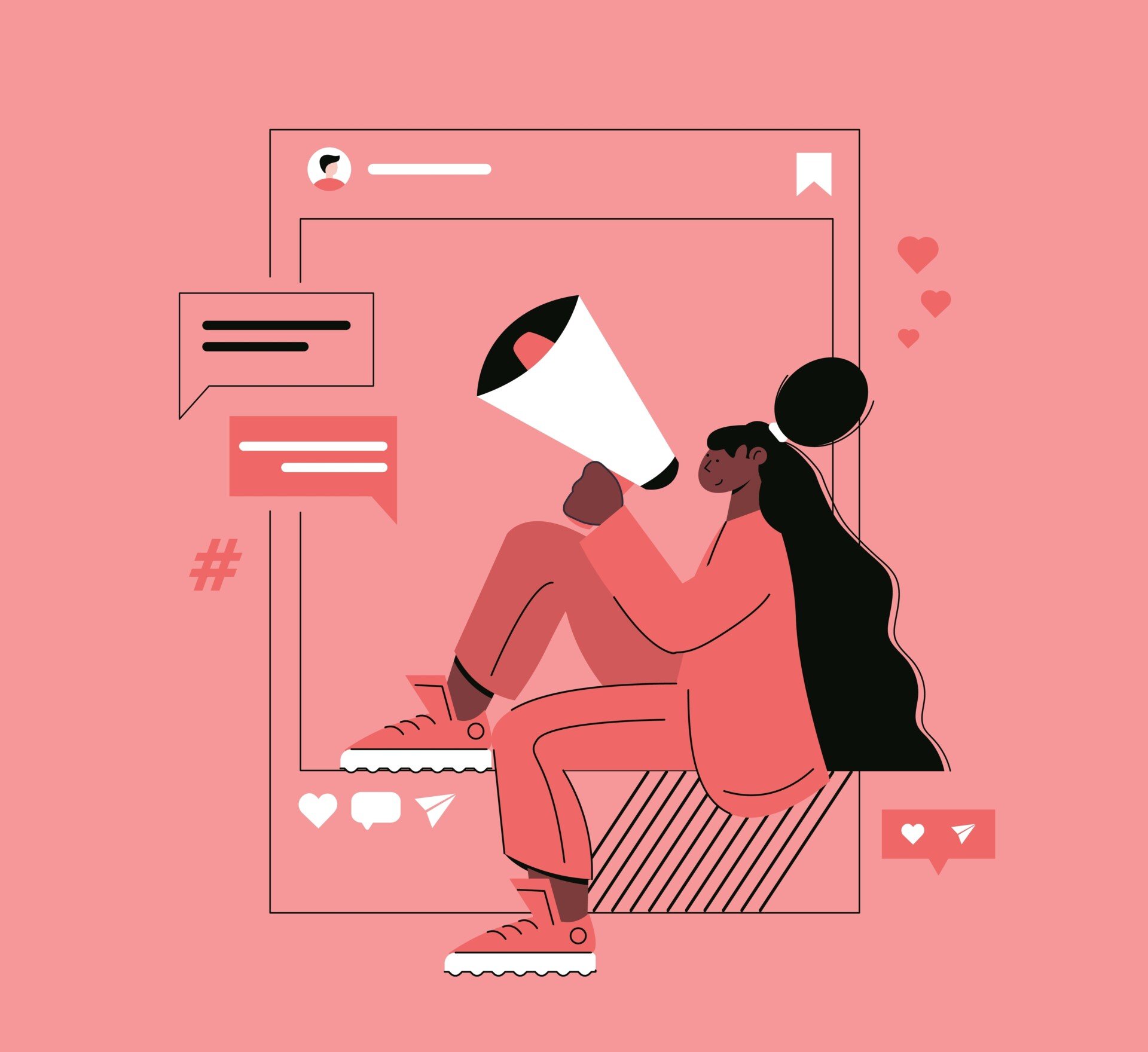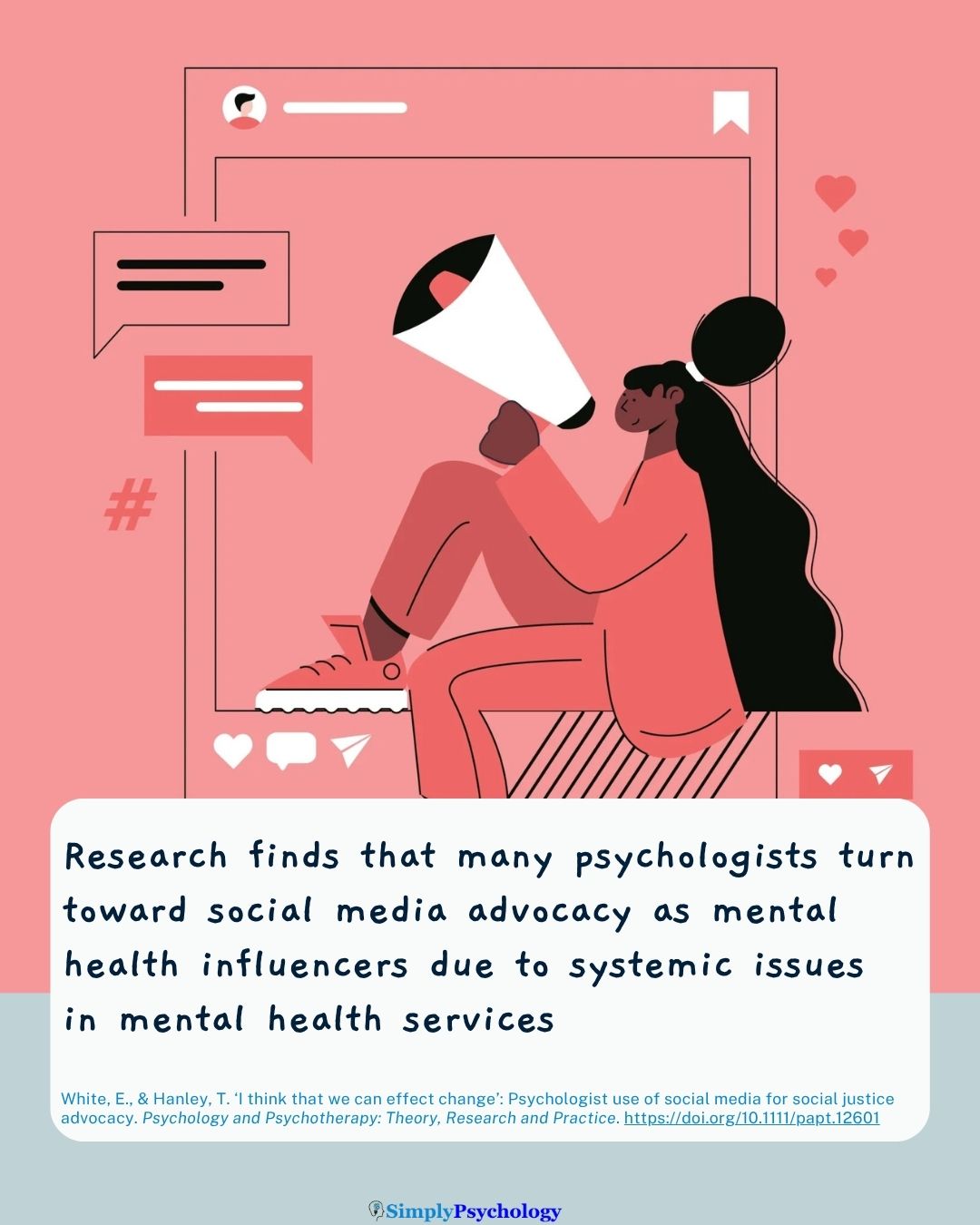Social media enables psychologists to raise awareness of systemic inequalities, share accessible psychoeducation, and challenge stigma. By highlighting social factors affecting mental health, they foster critical consciousness, empower marginalized communities, and promote collective action for change.

White, E., & Hanley, T. ‘I think that we can effect change’: Psychologist use of social media for social justice advocacy. Psychology and Psychotherapy: Theory, Research and Practice. https://doi.org/10.1111/papt.12601
Key Points
- Focus of Study: The study explores how UK-based practitioner psychologists use Instagram to engage in social justice advocacy as mental health influencers.
- Research Aims: The primary aim was to understand psychologists’ motivations and experiences using social media for social justice, particularly how systemic issues inform their online presence and content.
- Qualitative Approach: Reflexive thematic analysis within a social constructionist framework was used to analyze semi-structured interviews with 12 psychologists.
- Key Findings:
- Systemic issues in UK mental health services (e.g., NHS burnout, accessibility barriers) drive psychologists toward private practice and social media advocacy.
- Social media serves as a platform for raising mental health literacy and critical consciousness about systemic injustices.
- Tensions exist between advocacy goals and commercial interests, such as marketing therapy services.
- Implications: Psychologists can leverage social media to promote equity and accessibility in mental health, though ethical guidelines are needed to navigate identity, power, and professionalism online.
Rationale
Despite increasing public reliance on social media for mental health information, prior research focuses largely on ethical risks rather than motivations for psychologist engagement.
The study addresses a gap by:
- Investigating how systemic issues (e.g., long NHS wait times, inequities) inspire online advocacy.
- Exploring how psychologists use Instagram to balance advocacy and business needs.
- Highlighting the dual function of social media as a tool for both raising public awareness and sustaining private practices.
Research Question: What are practitioner psychologists’ experiences of Instagram use for social justice advocacy as mental health influencers?
Method
- Sample: 12 UK-based psychologists (11 female, 1 male), mostly White British, aged 29–45, from clinical, forensic, counselling, or sports psychology backgrounds.
- Context: Participants were required to have at least 1,000 Instagram followers. Most had transitioned from NHS or third sector roles to private practice.
- Data Collection: Individual semi-structured interviews conducted via Zoom (30–80 minutes).
- Data Analysis:
- Reflexive thematic analysis (Braun & Clarke, 2021).
- 176 initial codes reduced to 19, then to final themes and subthemes.
- Coding supported by NVivo 12.
- Member reflections incorporated to enhance credibility.
Results
Three key themes emerged:
1. Systemic Issues Motivating Instagram Use
Psychologists cited burnout, service constraints, and ethical conflicts within the NHS as reasons for moving into private practice and using Instagram for public engagement.
- “It brings up a lot of feelings of rage” (Mia).
- Social media offered a way to disseminate support broadly and regain a sense of purpose.
2. Contradictions Between Advocacy and Business
Participants felt conflicted between sharing free educational content and promoting paid services or passive products.
- “I want to be doing the stuff that’s going to bring me money… I’m not a marketer, I’m a therapist” (Liz).
- Decisions around placing content behind paywalls raised ethical concerns.
3. Using Social Media to Raise Consciousness and Literacy
Instagram was seen as a tool to:
- Raise awareness of systemic injustice (“I thought this was my problem and now I realise that it’s a systemic problem”).
- Increase mental health literacy by offering CBT-based posts and psychoeducation.
- Empower marginalized groups and reduce stigma.
Insight
This is the first qualitative study to specifically explore psychologists’ use of social media for social justice advocacy.
Key insights include:
- Social media can extend the reach of therapeutic knowledge beyond the therapy room.
- It offers a platform to challenge individual blame narratives by highlighting systemic influences.
- The study introduces new ethical and professional identity challenges for psychologists in digital spaces.
- Future research could examine how psychologists embody specific social justice roles online (e.g., informer, agitator, supporter).
Clinical Implications
- For Practitioners:
- Social media can supplement therapy by providing clients with psychoeducation and self-help tools.
- Psychologists should be trained on the ethical implications of dual roles (advocate vs. entrepreneur).
- For Services:
- NHS and third-sector providers could consider official Instagram accounts to disseminate resources and reach underserved populations.
- Policy Recommendations:
- Ethical guidelines should explicitly address social media use for advocacy.
- Psychologists should assess the appropriateness of product promotions and maintain transparency.
Strengths
This study had several methodological strengths, including:
- Thematic analysis was methodologically rigorous and reflexively conducted.
- Use of NVivo 12 provided an audit trail of codes and themes.
- Member reflections helped validate findings and ensured participant voice was respected.
- Rich, participant-driven data provide nuanced insights into the ethical tensions of public-facing psychology.
Limitations
This study also had several limitations, including:
- The study sample was predominantly White, female, and UK-based, limiting generalizability.
- Focus was on Instagram only—experiences may differ on platforms like TikTok or LinkedIn.
- The interview schedule did not originally center on social justice, which may have constrained depth in some areas.
- Self-selection bias may have led to overrepresentation of psychologists with strong social justice identities.
Socratic Questions
- Methodology:
- How might the choice of reflexive thematic analysis have influenced the themes identified?
- What are the benefits and drawbacks of using self-selected Instagram-active psychologists?
- Interpretation:
- Could the dual role of psychologist and influencer compromise the perceived authenticity of advocacy?
- In what ways might commercial interests distort the message or intent of social justice content?
- Application:
- How could NHS psychologists integrate social media advocacy without breaching ethical or employment policies?
- What systems might be needed to support psychologists using social media without risking burnout or regulatory conflict?
- Alternative Perspectives:
- How might a more diverse sample (e.g., different ethnic backgrounds or geographic locations) have affected the findings?
- Could there be unintended harms in simplifying complex psychological ideas for algorithm-optimized social media posts?
- Future Directions:
- How can training programs better prepare psychologists for navigating online professional identity and advocacy?
- Should regulatory bodies revise ethical codes to address the challenges and potentials of psychologist influencers?


